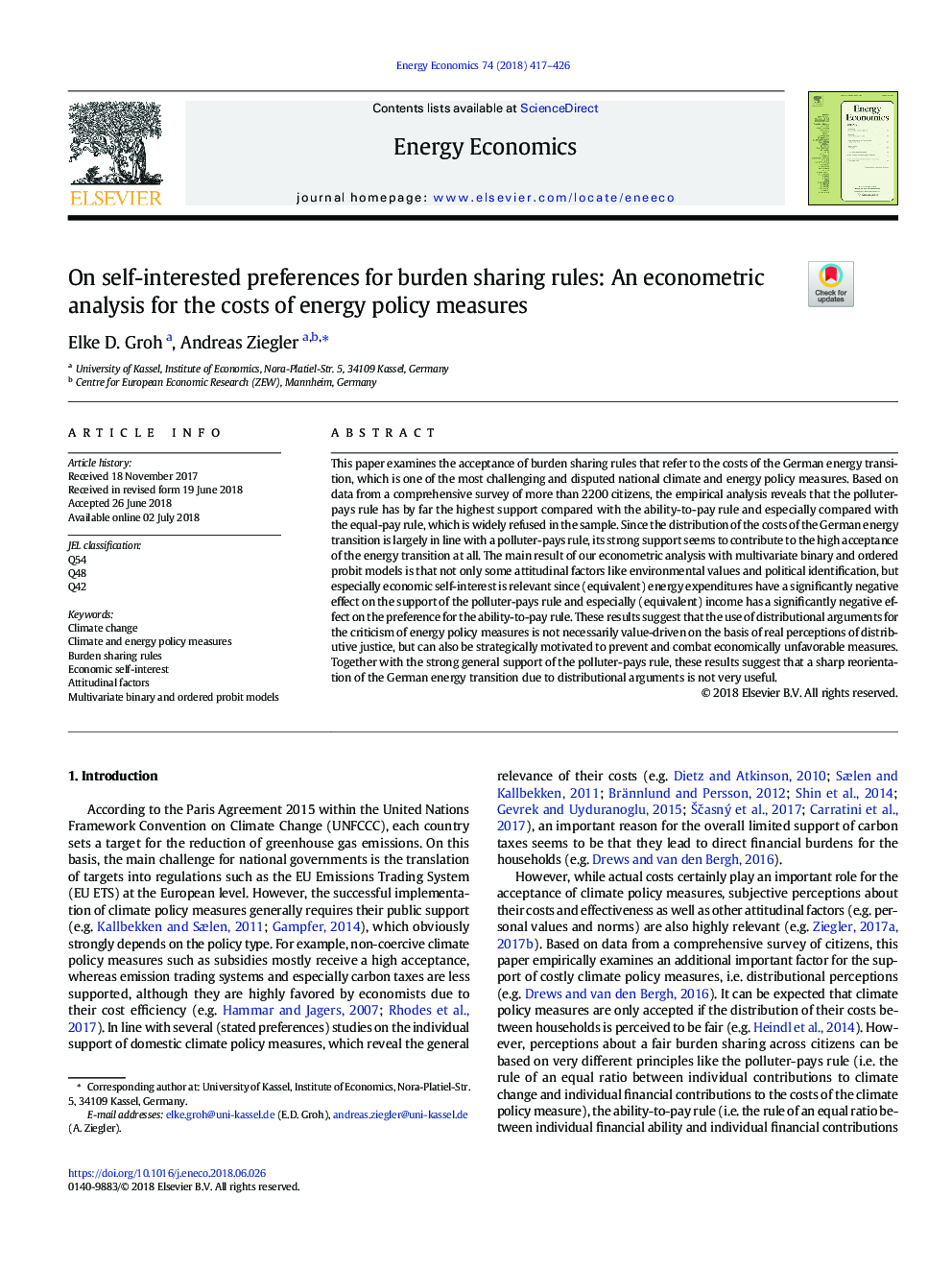| کد مقاله | کد نشریه | سال انتشار | مقاله انگلیسی | نسخه تمام متن |
|---|---|---|---|---|
| 7350340 | 1476689 | 2018 | 10 صفحه PDF | دانلود رایگان |
عنوان انگلیسی مقاله ISI
On self-interested preferences for burden sharing rules: An econometric analysis for the costs of energy policy measures
ترجمه فارسی عنوان
تنظیمات خودخواهانه برای قوانین تقسیم بار: یک تحلیل اقتصادی برای هزینه های اقدامات سیاست انرژی
دانلود مقاله + سفارش ترجمه
دانلود مقاله ISI انگلیسی
رایگان برای ایرانیان
کلمات کلیدی
ترجمه چکیده
این مقاله، پذیرش قوانین توزیع بار را مورد بررسی قرار می دهد که به هزینه های انتقال انرژی آلمان اشاره دارد که یکی از اقدامات کلیدی و بحث برانگیز ملی آب و هوا و سیاست های انرژی است. بر اساس داده های یک نظرسنجی جامع از بیش از 2200 شهروند، تحلیلی تجربی نشان می دهد که قاعده آلوده کننده پرداخت تا حد زیادی بیشترین حمایت را نسبت به قانون توانایی پرداخت و به ویژه در مقایسه با قانون حقوق برابر دارد که به طور گسترده ای در نمونه رد شد از آنجا که توزیع هزینه های انتقال انرژی آلمان عمدتا در راستای یک قانون پرداخت آلاینده است، حمایت قوی آن به نظر می رسد در پذیرش پذیرش انتقال انرژی در همه موارد کمک کند. نتیجه اصلی تجزیه و تحلیل اقتصادسنجی ما با مدل های چند متغیره دوبعدی و دستورالعمل پروبیت این است که نه تنها برخی از عوامل نگرش مانند ارزش های زیست محیطی و شناسایی سیاسی، بلکه به ویژه بهره وری اقتصادی مرتبط است از آنجا که هزینه های انرژی (معادل) تأثیر منفی بر حمایت حقوق حقیقی آلوده کننده و به ویژه درآمد (معادل) اثر منفی بر ترجیح دادن قواعد توانایی پرداخت دارد. این نتایج نشان می دهد که استفاده از استدلال های توزیع برای انتقاد از اقدامات سیاست انرژی لزوما به ارزش بر اساس درک واقعی از عدالت توزیع نیست، بلکه می تواند به لحاظ استراتژیک برای جلوگیری و مبارزه با اقدامات نامطلوب اقتصادی موثر باشد. این نتایج همراه با حمایت عمیق قاطع از قانون پرداخت آلودگی، نشان می دهد که تغییرات تیز در انتقال انرژی آلمان به دلیل استدلال های توزیع بسیار مفید نیست.
موضوعات مرتبط
مهندسی و علوم پایه
مهندسی انرژی
انرژی (عمومی)
چکیده انگلیسی
This paper examines the acceptance of burden sharing rules that refer to the costs of the German energy transition, which is one of the most challenging and disputed national climate and energy policy measures. Based on data from a comprehensive survey of more than 2200 citizens, the empirical analysis reveals that the polluter-pays rule has by far the highest support compared with the ability-to-pay rule and especially compared with the equal-pay rule, which is widely refused in the sample. Since the distribution of the costs of the German energy transition is largely in line with a polluter-pays rule, its strong support seems to contribute to the high acceptance of the energy transition at all. The main result of our econometric analysis with multivariate binary and ordered probit models is that not only some attitudinal factors like environmental values and political identification, but especially economic self-interest is relevant since (equivalent) energy expenditures have a significantly negative effect on the support of the polluter-pays rule and especially (equivalent) income has a significantly negative effect on the preference for the ability-to-pay rule. These results suggest that the use of distributional arguments for the criticism of energy policy measures is not necessarily value-driven on the basis of real perceptions of distributive justice, but can also be strategically motivated to prevent and combat economically unfavorable measures. Together with the strong general support of the polluter-pays rule, these results suggest that a sharp reorientation of the German energy transition due to distributional arguments is not very useful.
ناشر
Database: Elsevier - ScienceDirect (ساینس دایرکت)
Journal: Energy Economics - Volume 74, August 2018, Pages 417-426
Journal: Energy Economics - Volume 74, August 2018, Pages 417-426
نویسندگان
Elke D. Groh, Andreas Ziegler,
